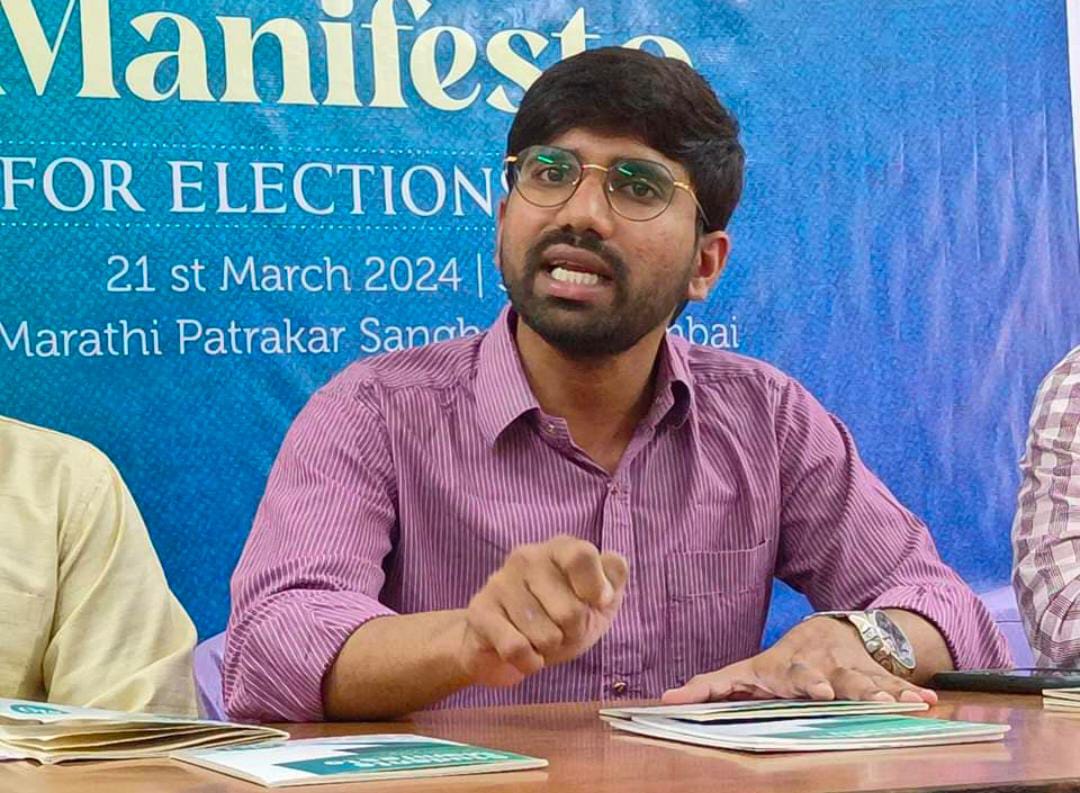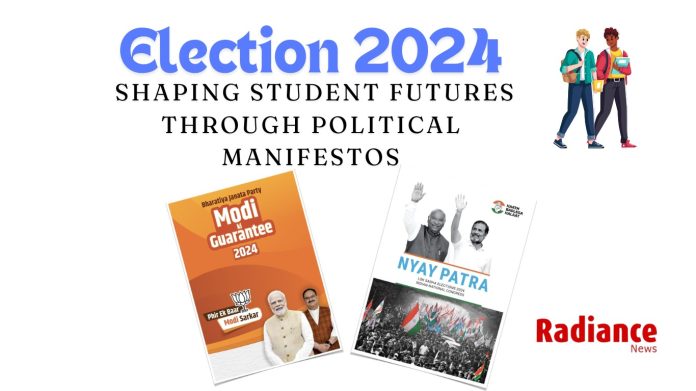With the nation’s future at stake, it is imperative for political leaders to heed the voices of the people and commit to implementing changes that pave the way for a brighter tomorrow.
– Syed Ahmed Ali
As India gears up for the 2024 Lok Sabha elections, the democratic process takes center stage. Political parties across the nation are fervently engaged in campaigning, offering promises of a brighter tomorrow. To delve deeper into the significance of these promises for the student community and the future of the country, we’ve engaged in dialogue with Dr. Roshan Mohiddin, Director of the Centre for Educational Research and Training (CERT) and National Secretary of SIO India.
 In anticipation of the forthcoming elections, students and youth emerge as a pivotal demographic with profound aspirations and pressing concerns. They collectively envision a future ripe with opportunities and are eager for substantial change. This demographic looks to political parties to address their challenges and advocate for their causes. At the forefront of this electoral battle are the Indian National Congress (INC) and the Bharatiya Janata Party (BJP), each presenting its vision for India through its manifesto.
In anticipation of the forthcoming elections, students and youth emerge as a pivotal demographic with profound aspirations and pressing concerns. They collectively envision a future ripe with opportunities and are eager for substantial change. This demographic looks to political parties to address their challenges and advocate for their causes. At the forefront of this electoral battle are the Indian National Congress (INC) and the Bharatiya Janata Party (BJP), each presenting its vision for India through its manifesto.
Amidst the political fervor, several ground-breaking reports compiled by social organizations have been presented to political parties. Organizations like SIO, INECC on climate change, and People’s Manifesto have underscored the pressing concerns confronting society and students. They have outlined the priorities and policies that need to be adopted by political parties to address the current situation effectively.
Challenges Faced by Students
- Quality Education: The inadequacy of infrastructure and a shortage of qualified teachers in many secondary schools and colleges, especially in rural areas, hinder students’ ability to learn in a conducive environment.
- Unemployment: Graduates entering an already competitive job market face a scarcity of suitable employment opportunities, leading to frustration and disappointment.
- Affordability: Soaring costs of education and rising property prices make quality education unattainable for many students from lower-income communities. The burden of student loans exacerbates economic hardships, deterring aspiring students from pursuing higher education.
- Competency Development: There exists a noticeable mismatch between the skills taught in traditional academic settings and the evolving demands of the modern job market. Students seek more avenues to develop competencies and skills relevant to rapidly changing industries.
In the backdrop of the COVID-19 pandemic, which has disrupted traditional modes of education and exacerbated existing inequalities, the urgency for comprehensive educational reforms has never been more apparent. It is imperative for political parties to transcend mere rhetoric and present actionable plans that cater to the diverse needs of students across the nation.
Expectations from Political Manifestos
As the political landscape intensifies in anticipation of the 2024 Lok Sabha elections, college students eagerly await the unveiling of political manifestos. Despite constituting a significant voting bloc, there is a conspicuous absence of emphasis on education in the manifestos of founding political parties.
The BJP’s manifesto, encapsulated in “Modi ki Guarantee,” champions a “charitable state” concept, projecting welfare schemes as governmental deeds. However, it has been cautious in addressing issues concerning religious minorities and pluralism, with a focal point on Prime Minister Modi and his personal assurances.
In contrast, the Congress party’s “Nyay Patra” manifesto presents a formidable challenge to the BJP’s approach. It places economic inequality at the forefront and advocates for a new framework for social justice. This includes conducting a nationwide socio-economic and caste census, raising the cap on reservations, and implementing quotas for Economically Weaker Sections (EWS). Additionally, the manifesto emphasizes the need to accommodate religious and linguistic minorities to uphold pluralistic values.
Criticism and Praise for Manifestos
The ruling BJP faces criticism for its lack of substantial commitments to education in its manifesto. Experts note that its emphasis on “digitalization” falls short of addressing the multifaceted challenges confronting students. Conversely, the INC has articulated proposals such as extending the Right to Education (RTE) until Class 12 and enhancing scholarships. However, it falls short of specifying the allocation of 6% of the Gross Domestic Product (GDP) to education.
While the promises outlined in the BJP’s manifesto align with the principles of the National Education Policy (NEP) 2020, critics argue that the projected timelines for achieving these objectives extend far into the future, posing challenges for students.
The BJP manifesto pledges a commitment to quality education through various initiatives, including the establishment of new higher education institutions and the expansion of skills education for children. However, experts caution that the emphasis on virtual infrastructure improvement relies heavily on personal zones or public-private partnerships (PPPs), potentially leading to issues of accessibility and fairness.
Conversely, the Congress manifesto recognizes the complementary role of the non-public sector in bolstering public education. It promises to waive outstanding education loans and extend the RTE Act until Class 12. Furthermore, it vows to revisit recent reforms, including the NEP 2020 and centralized assessments, while emphasizing the importance of consulting state governments in this process.
Key highlights of the Congress manifesto include proposals to establish authorities to network schools in each block, regulate private college fees, and address staffing shortages in academic institutions. Moreover, it places a greater emphasis on restoring the autonomy of faculties and universities, safeguarding students’ freedom of speech and expression, and fostering research and innovation.
Despite addressing some concerns, both manifestos fall short in crucial areas such as research funding, which is vital for India’s progress into a leading economic powerhouse. However, each party dedicates sections of their manifestos to address the concerns and aspirations of the populace, recognizing their significance in the upcoming elections.
The Lokniti 2024 pre-poll survey underscores price inflation and unemployment as primary concerns among residents, emphasizing the importance of youth engagement and employment in the political discourse. While the BJP prioritizes entrepreneurship and digital innovation, the Congress focuses on employment and education reforms, aiming to eliminate unpaid internships and create direct employment avenues for youth.
As the countdown to the 2024 Lok Sabha elections draws closer, Indian college students passionately call upon political parties to prioritize education and comprehensively address their concerns. With the nation’s future at stake, it is imperative for political leaders to heed the voices of the people and commit to implementing changes that pave the way for a brighter tomorrow.
Only through concerted efforts and genuine resolve can we shape a future where education plays a central role in progress and advancement.




